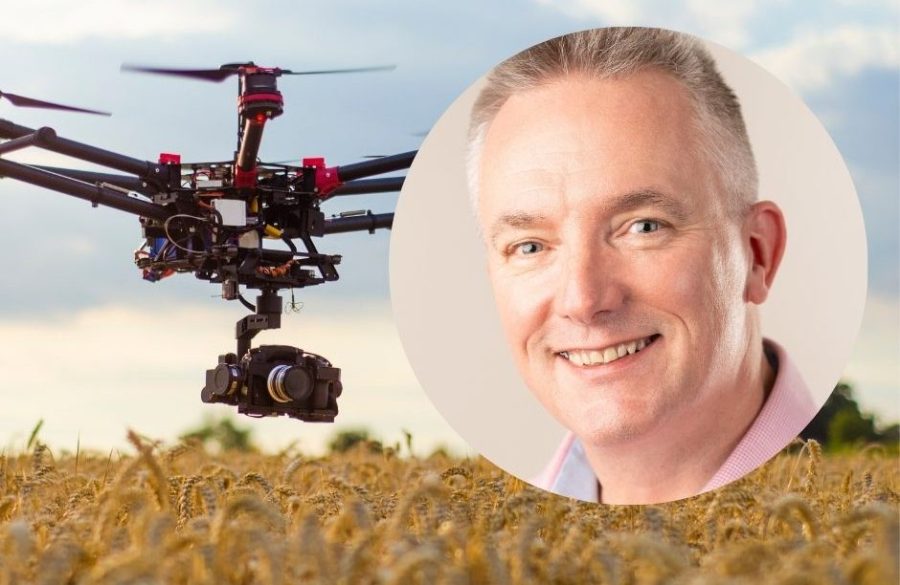Syngenta’s head of technology identification and evaluation for crop protection, Dave Hughes, suggests with agriculture undergoing a blistering pace of change, it’s hard to predict where things may lead.
“However, it’s clear we’ll be doing things very differently in 25 years’ time. At the moment we have sensors in fields, drones and satellites, but the clever part is integrating these data sources to create actionable outcomes.
“This will enable us to apply exactly what’s required, only when and where it’s required, to achieve better results with fewer inputs,” he explains.
“Furthermore, I see inputs becoming more biological-based, particularly for pest control. History tells us inventing and commercialising novel, highly effective biological products is really hard. However, dramatic improvements in the technologies we use coupled with an increase in demand for biology-based solutions, is likely to change the landscape considerably.”
Climate change threat
He cites climate change as a significant threat to global agriculture – a rise in sea level will flood areas of productive farmland, especially for rice which is often grown on low-lying river deltas. Climatic zones will shift which will affect which crops can grow where and as such, farmers will have to adapt, notes Dave.
Extreme weather events, such as the extraordinarily wet recent months in the UK, already seem to be compromising agricultural yields, he suggests. “This is already happening. The full extent of these future impacts remains highly uncertain, although it is very likely to be bad.”
Societal views
Dave also highlights the impact of society’s attitude to the use of technology in food production. “Many are deeply sceptical about new technologies and believe we should return to growing food as we did 100 years ago, but it’s surely obvious that such systems couldn’t feed the future global population without destroying huge areas of the planet’s remaining wildlands. The worry is, if the anti-tech voice becomes loud enough, politicians could move to restrict the use of safe and beneficial technologies.”
Instead, he believes technology should be used to improve both productivity and sustainability at the same time. “For example, how to truly improve biodiversity, sequester carbon and reduce greenhouse gas emissions while simultaneously improving crop yields. A lot of smart people are thinking about how this might be done, so providing the ideas come through, this will prove a major growth area.
“But if we’re serious about eliminating fossil fuel use, we have to think about carbon-based raw materials for things like medicines, plastics, fibres and liquid fuels which we all depend on. The only feasible way of producing these raw materials at the scale required will be to extract from plants, so in the future, food will be only one output of many which are derived from crops,” he says.
Power to influence
According to Dave, with ‘loads of cool stuff’ being developed worldwide, it’s about getting new technologies into the right hands. “Be vocal and have a voice to influence – help to challenge society’s perceptions – release the handbrake. Society has to appreciate what it takes to get food onto supermarket shelves,” he stresses.
Dave illustrates his point further by using the example of GM. “Excessive regulation in the 1990s made it so expensive to get a new GM crop onto the market, that it destroyed the business case for almost all applications of the technology.
“It’d be straightforward to use GM to create food which is ultra-nutritious or ultra-delicious, or which could be produced in a more environmentally-friendly way, but it’d cost well over $100M to get the product to the market so anyone attempting to do so would lose a lot of money.”
Gene editing
According to Dave, the industry is in a similar position with GE (gene editing), with decisions currently being made on how best to regulate the technology. “Scientists have already proved that GE can be used to improve flavour, nutritional content, shelf-life, crop yield, environmental robustness, pest resistance and many other beneficial traits.
“It really is an exciting time to be in plant breeding – a new vista is opening up. So long as we choose a regulatory path that doesn’t smother this opportunity at birth!”
In addition, he raises the constraints of looking backward rather than forward. “Our society loves science and technology – we can’t get enough of it in almost every aspect of our lives apart from our food, where traditionalism is valued more than innovation.
“It seems we want to eat the same food as our grandparents, produced in the same way. But just to pause for a moment – is there any other aspect of our lives where such sentimental thinking applies?
“Would we want to undergo dentistry or surgery as our grandparents experienced, or take the same medicines? Or be transported, entertained, or communicate in the same way? I don’t think so, and yet in consideration of our food supply, this rose-tinted nostalgic thinking is mainstream,” says Dave.
More from less
He ends by reminding of the core challenge agriculture faces – producing more food from much less land, in much more environmentally friendly ways, while resisting the potentially catastrophic effects of climate change.
“There’s no way we can rise to the challenge of feeding 10Bn people in the near future using the technologies of our grandparents’ generation. We must innovate, but society’s mistrust of innovation in our food system is making the task more difficult,” concludes Dave.
This article stems from CPM’s Arable Farming 2050 feature, which was written to celebrate the magazine’s 25th anniversary.




